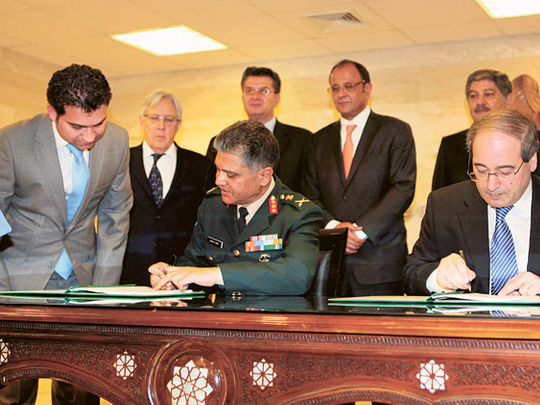
Brussels Despite oft-repeated US demands that Syrian President Bashar Al Assad step aside, the Obama administration's policy now reflects a consensus that Al Assad has a firm hold on power and that nothing short of an outside military strike will dislodge him quickly.
With rebel forces poorly armed and disorganised, efforts to pay them by Arab Gulf states failing, and sectarian divisions looming in Syria, the US and its allies seem prepared to leave Al Assad where he is. Even if he could be ousted, the near future in Syria could involve civil war among ethnic groups now under Al Assad's boot, or a slow and bloody war with rebels or proxy fighters armed from the outside.
The US has edged toward supplying the rebels with communications gear and other non-lethal aid but has ruled out either a military assault or a supply of heavy weaponry for rebel forces.
"We are at a crucial turning point," US Secretary of State Hillary Rodham Clinton said Wednesday.
Either a United Nations-brokered ceasefire takes hold "or we see Al Assad squandering his last chance before additional measures have to be considered," Clinton said.
UN Secretary-General Ban Ki-moon said late Wednesday he believes there is an opportunity for progress in Syria and recommended the Security Council approve a 300-strong UN observer mission.
In a letter obtained by The Associated Press, Ban told the council he will consider developments on the ground, including consolidation of the cease-fire, before deciding on when to expand the mission beyond the 250 observers initially envisioned. The Security Council was scheduled to discuss Ban's letter and recommendations at a closed meeting yesterday morning.
US officials regularly say Al Assad is no longer a legitimate leader, but they hold no direct leverage to make him leave, or even make him listen to international condemnation.
"Al Assad must step down," US Defence Secretary Leon Panetta said this week. "I mean, we continue to take that position. At the same time, I think, we believe that we have to continue to work with the international community to keep putting pressure on [Al] Assad."
Even relatively harsh new sanctions on Syria are a tacit admission that Al Assad isn't going anywhere any time soon. And the rebels are no closer to ridding the country of him despite 13 months of fighting and 9,000 mostly civilian deaths. The Obama administration recently signed off on $12 million (Dh44 million) in enhanced communications, medical and other assistance to the opposition, but it is unclear what goods are making their way into Syria and by what means.
International sanctions on Al Assad's regime have depleted its foreign currency reserves by half — and Damascus is actively trying to evade them, French Foreign Minister Alain Juppe said Tuesday.












